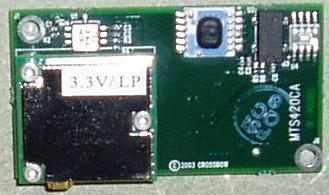
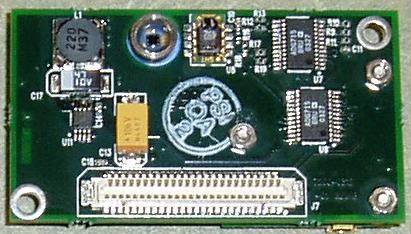
The Fire Board is a collection of five sensors mounted on a printed circuit board, manufactured by Crossbow Technology, Inc., and marketed under the product identification MTS420CA.


The sensors mounted on the Fire Board are:
Temperature and humidity data are collected using the Sensirion SHT11.
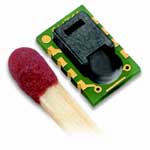
The Sensirion SHT11 sensor is manufactured by:
Sensirion AG Eggbuehlstrasse 14 CH-8052 Zurich Switzerland Telephone +41 (0)1 306 40 00 Fax +41 (0)1 306 40 30 info@sensirion.com http://www.sensirion.comSpec sheet is located at: @url http://www.sensirion.com/en/sensors/humidity/sensors_devices/sensorSHT11.htm
Characteristics of the sensor, from the web page given above:
- 2 sensors for relative humidity & temperature
- Precise dewpoint calculation possible
- Measurement range: 0-100% RH
- Absolute RH accuracy: +/- 3.5% RH
- Temp. accuracy: +/- 0.5°C @ 25 °C
- Calibrated & digital output (2-wire interface)
- Fast response time < 4 sec.
- Low power consumption (typ. 30 µW)
- Low cost
From the PDF spec sheet, the combined sensor is 14 bit ADC.
===== Relative humidity =====
Range: 0 to 100 % RH
Accuracy: +- 3.5 % RH (20 to 80% RH)
Response time: =< 4 sec.
Reproducibility: +- 0.1 % RH
Resolution: 0.03 % RH
Operating temperature: -40 to 120 C
===== Temperature =====
Range: -40 to 120 C
Accuracy: +- 0.5 C @ 25 C, +- 0.9 C (0 to -40 C)
Response time: =< 20 sec.
Reproducibility: +- 0.1 C
Resolution: 0.01 C
===== Electrical =====
Power consumption:
30 uW @5V, 12 bit, 2 sec. sampling
1 uW @2.4V, 8 bit, 2 min. sampling
Supply Voltage range: 2.4 to 5.5 V
Measurement input current: 0.5 mA
Standby input current: 0.3 uA
* Integrated pressure sensor
* Pressure range 300-1100 mbar
* 15 Bit ADC
* 6 coefficients for software calibration stored on-chip
* 3-wire serial interface
* 1 system clock line (32.768 kHz)
* Low voltage / low power
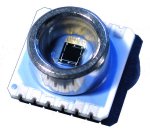
The LeadTek 9546 GPS unit has 12 channels "All-In-View" satellite tracking with cold/warm/hot start times of 45/38/8 Seconds (respectively) a reacquisition time of 0.1 seconds and supports standard NMEA-0183 and SiRF binary protocols The hardware consists of SiRFstarII chipset with embedded ARM7TDMI, an external antenna jack, 20 pin connector, and protective metal cover sheild, measuring 25.4 x 24.1 x 6.9 mm.
The GPS unit is relatively expensive to operate. From a cold start, it requires 65 mA of power, then runs until the GPS reading is stabilized. Since the FireBug application is statically deployed, the GPS unit need only run until an accurate location fix has been obtained, at which point the GPS is powered off.
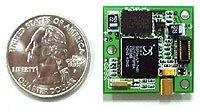
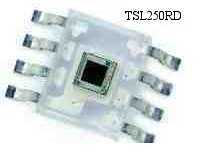
| SHT11 | TSL250RD | LeadTek 9546 | Intersema | ADXL 202AE | |
| Supply voltage | 2.4 - 5.5 | 2.7 - 5.5 | 3.3 +/- 5% | 2.2 - 3.6 | 3.0 - 5.5 |
| Power consumption | ??? | 1.7 mA | ??? | ??? | ??? |
| Measurement range | ??? | 1.5 - 2.5 V | ??? | 300 - 1100 mbar | +/- 2 g |
| Accuracy | ??? | ??? | ??? | ??? | ??? |
| Resolution | ??? | ??? | ??? | ??? | ??? |
| Response time | 4 sec. | 260 us (voltage rise time) | 45 sec. (cold) | 1 sec. | ??? |
| Operating temperature | ??? | 0 - 70 C | ??? | ??? | -40 - +85 C |
The MTS420CA has two ADG715 switches mounted in parallel on the I$^2$C bus. Switch 0 is mounted on U7 and controls the power to the sensors. Switch 1 is on U9 and controls I/O functionality. These switches are controlled by the MicaWBSwitch component, which uses a parameterized interface to control which switch is active. The switches may be operated independently of each other, allowing the application to control the power to each sensor to reduce power consumption.
The Data Structure for the communication data packet is defined in SensorMsg.h.
SensorMsg.h
typedef struct SensorMsg {
uint16_t MoteID; //TOS_LOCAL_ADDR
uint16_t HumidityData;
uint16_t TempData;
}SensorMsg;
enum {
AM_SENSORMSG = 128
};
|
The mote attached with Fire Board sends data packet in AM type through the RF. The GenericBase is the receiver of these packets. We use SensorPacket---a Java application program to resolve the temperature readout from the packet, and do the mathmatics coversion from the readout to the actual temperature.
SensorPacket.java
public String toString(byte [] packet) {
String s = "Message
|
Temperature= d1+d2*SO
Celsius : d1=-40, d2=0.01
Fahrenheit : d1=-40, d2=0.018
SO : Sensor Output
|
The SensorPacket result will be like :
7e 00 0a 7d 06 03 00 99 99 f9 17 ed 55 0e 8b c9 98 89 b2 90 4e 40 08 88 98 8e cc
0d cc b5 ba 99 98 0a 01 00
Message
|
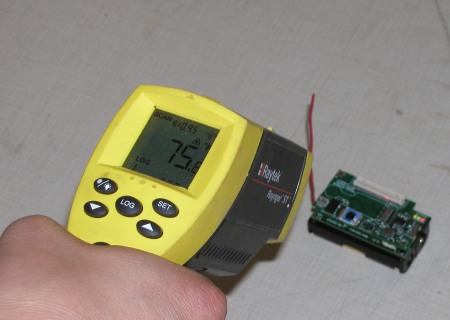
Last updated: $Date: 2004/01/06 16:29:47 $ by $Author: doolin $.